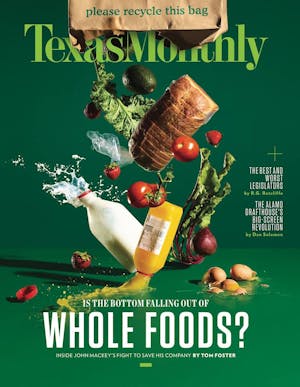The Texanist, despite what you may have come to believe over these years, does not know it all. In fact, there are numerous matters about which he is completely ignorant. Just ask Mrs. Texanist. Sometimes it is surprising just how unfamiliar he can be with a given subject. But it’s particularly amazing when he comes across a thing that has somehow, despite his fifty-plus years of life on this earth, completely escaped him.
This is precisely what happened with the Chilton cocktail, the simple and citrusy adult beverage that every Lubbockite, every Texas Tech alumnus, most every resident of the vast South Plains, and a scant few others have been imbibing for as long as they can remember.
Until just a few years ago I had never even heard of a Chilton, much less enjoyed its tart and crisp effervescence. The drink and I were first introduced by a Lubbock-area native and Tech alum co-worker. And then tippling colleague Courtney Bond mentioned the drink’s historical vagaries in her May 2016 Vittles column, stirring my curiosity.
The Chilton’s origin story, as told on the World Wide Web, is short, sweet, and completely unsubstantiated by way of any concrete documentation. In some unspecified year, a man or, possibly, a woman, known only as Dr. Chilton, asked a bartender at the Lubbock Country Club to salt the rim of a highball glass; fill it with ice, the juice of two lemons, one and a half ounces of vodka, and enough soda water to top it off; and then stir it gently, garnish it with a lemon wheel, and serve it to him. Or her. Ladies and gentlemen, meet the Chilton cocktail. That’s it. There’s nothing more.
Who, I’ve wondered, was this Dr. Chilton? What kind of medicine did he or she practice? Exactly when did this occur? Is Dr. Chilton still alive? Would it be possible to send a note of thanks for coming up with this tantalizingly tangy tincture?
It was in search of answers to such questions that I recently found myself pounding the pavement—as well as a number of Chiltons—in the Hub City like some sort of thirsty, alcoholic gumshoe.
The venerable Lubbock Country Club would be my first stop. On a beautiful May afternoon, I met with Jerod Becton, the general manager and CEO. Becton, a good-humored guy, explained to me with pride how the lounge where we had bellied up to the bar, a comfortable alfresco spot, was a new addition to the club named, would you believe, Chilton’s.
At Chilton’s, Becton introduced me to clubhouse manager Joey Porter, also a real nice fellow. Porter, a former waiter, mixed up two Chiltons for me. Chilton varietals have become a thing in Lubbock, and alongside my classic rendition sat a delicious version that utilized Deep Eddy Ruby Red vodka in lieu of the plain stuff.
As we overlooked the golf course and its surprising-for-Lubbock verdancy while I took alternating sips from my Chiltons, Becton explained that the drink’s origin was a bit of a mystery. Everyone knew the story, but nobody knew who Dr. Chilton was. Curiously, there is no record of a Dr. Chilton having been a member of the club—though it should be noted that membership rolls only go as far back as the early fifties.
My two new friends had a steak dinner to prepare for and I had kept them too long, so I polished off my cocktails and headed out. But not before chatting with the club receptionist, Cleetta Hatchett, who has been with the LCC for 39 years. Hatchett, a pleasant woman, started out as a bartender and recalled quite clearly that the club was serving Chiltons back when she began—the earliest sighting of the Chilton I have been able to document. Ms. Hatchett, while helpful, was unable to corroborate the story of the drink’s creation.
My next stop was Chimy’s Cerveceria, a watering hole across from the Tech campus. The students were gone for the summer, but the bar was hopping. Though I didn’t see a lot of Chiltons being drunk, the young bartender didn’t skip a beat when I placed my order. “Serve a lot of these?” I yelled at her. “Huh?” she said. “Do you serve a lot of Chiltons?” “Oh, yes. Lots! They’re a Lubbock thing.” “Thank you,” I said before making my way to the patio.
From Chimy’s I made my way over to the Lone Star Oyster Bar, on 34th Street. It had been recommended as one of Lubbock’s best purveyors of Chiltons. The O Bar, as it is known, a place where cigarette smoking appears to be mandatory, is as charmingly lowbrow as the LCC is highbrow. It serves delicious Chiltons in large, remarkably affordable schooners. For some reason, maybe geography, I was surprised, despite the business’s name, to see that they were shucking actual oysters behind the bar. I passed.
Cafe J had also been recommended. I found a seat at the bar, which was ably tended by an efficient young man who goes by the name Kinny McKinney. McKinney, who made a nice Chilton and served me an excellent pork chop, had little to add to my Chilton knowledge base. He suggested a nearby bar called Flippers Tavern, a place, he said, that mixed up a top-notch Chilton.
Kinny McKinney did not mislead. Flippers, as stylish a pinball-themed bar as I have ever had the pleasure of stumbling into, was lively, and the barkeep recommended a novelty Chilton made with Sweden’s Svedka cucumber-lime vodka. While it sounds a little odd, the subtle cucumber flavor works quite well with the salt and lemon. Flippers has a heck of Chilton, but I left there, slightly wobbly, without scoring any answers.
All the lemon juice was beginning to take its toll on my tummy, and it was time to call it a night. But the lobby bar at my hotel was buzzing. “May I have a Chilton, please?” “Tito’s?” the bartender asked. “Sure. Hic! Excuse me.”
Good night, Dr. Chilton, whoever you are.
I popped up the next morning feeling surprisingly chipper. But the mystery I had come to Lubbock to investigate remained unsolved. So, on my way out of town, I stopped by the main branch of the Lubbock public library to peruse some old city directories.
Because the Lubbock Country Club was established in 1921, I began around that time and went on up through the decades, looking for Chiltons involved in the medical profession. 1928: an oilman named Chilton. 1933: a traveling salesman. 1940: a foreman. And then another salesman, a carhop, a brick mason, a student, and so on. Lubbock has almost always been populated with Chiltons, but I never found one who was listed as a physician, or even a professor.
Perhaps “Doc” was simply a nickname, unassociated with any profession. Or perhaps Chilton lived outside Lubbock proper. Maybe in Wolfforth, or Shallowater, or Idalou. I suspect we’ll never know.
I believe it was the tennis star Arthur Ashe who said, “Success is a journey, not a destination. The doing is often more important than the outcome.” Hear, hear and a cheer to that. In the end, despite my best efforts, the only thing I actually got to the bottom of during my time in Lubbock was a bunch of Chilton cocktails. Hardly a failure in my book.
On the road back to Austin, my mind turned to ranch water. Have you ever had a ranch water? It’s sort of like a Mexican Chilton, made with tequila, orange liqueur, lime juice, and Topo Chico. It’s said to have been born somewhere in the Trans-Pecos, maybe in Fort Davis, or maybe at the Gage Hotel, in Marathon. I wonder.
Wanna discover libation for yourself? Try our recipe for the Chilton.








